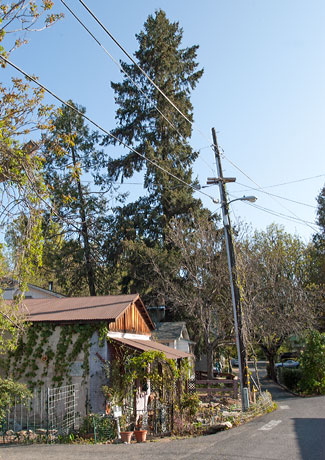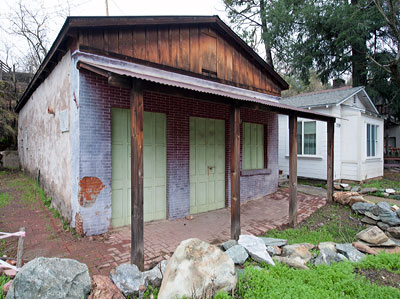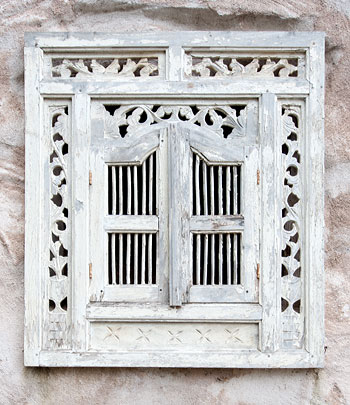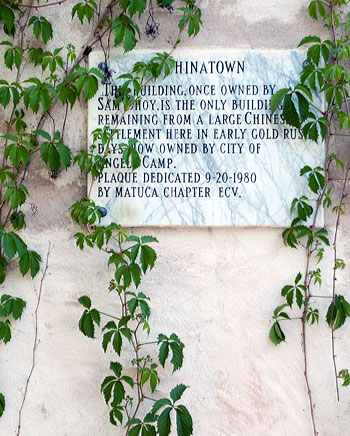National Register of Historic Places in Calaveras County
Sam Choy Brick Store
Bird Way
Angels Camp
Built 1860-1861
The Sam Choy Store is a typical Mother Lode brick Classical Revival commercial building with a three-bay front and walls of native schist stone. It was built for Sam Choy, the most prosperous of the local Chinese merchants. Choy raised his family in Angels Camp, sending his daughters back to China so that they could take their place in Chinese society.
Chinatown consisted of about twenty separate properties: gardens, lodging houses, gambling dens, opium dens, a wash house, two stores made of brick, and one store made of adobe.
The graveyard was on a hill to the north. All of the bodies were disinterred for shipment back to China, many of them not until the early 1930's.
Most of the Chinese were single men. Many resided on bunks in lodging houses. Many of the single men worked as miners along Angels Creek in the Slab Ranch area to the east.
In addition to the brick store, Choy owned several gambling dens. He controlled groups of Chinese workers, who were contracted to the mine owners, and he furnished the workers with food clothing, lodging, tools, and women. He collected the pay from the contractor and controlled the workers' finances.
At the beginning of he 20th century, the property was owned by an Italian who added a wood frame second story which was occupied as a "female boarding house" with a Chinese staff.
From the 1930's through the 1950's the building was used as the Angels Camp Jail. Old timers still remember drunks singing in the jail all the night long.
Adapted from the NRHP nomination.

Mining camps started as clusters of tents and other makeshift shelters. If the mine was productive, wooden buildings were erected and a town was born.
Conflagrations were a recurring curse. Often entire town were repeatedly destroyed by fire. Stonemasons, especially Italian immigrants from Liguria, began building "fire proof" banks and stores of stone or brick with iron doors and iron window shutters to protect the contents from fire.
Many of these stone buildings survive. Some of them, such as the Butte Store, are the sole reminders of a lost mining town.
Some of these buildings are:
Butte Store in Amador County
Calabozo in Hornitos
Civil War Armory in Georgetown
Compere Store in Murphys
Downieville Museum in Downieville
Fountain & Tallman Soda Works in Placerville
Gamble Building in Big Oak Flat
Hirshfeldter Building in Downieville
Honigsberger Store in Copperopolis
Italian Store in Douglas Flat
Kohler Store in Washington
Mackerman & Company Building in Downieville
Masonic Lodge in Columbia
Masonic Lodge in Hornitos
Nevada Brewery in Nevada City
Nevada Theatre in Nevada City
Odd Fellows Hall in Big Oak Flat
Old Segale Building in Murphys
Old Stone Garage in Truckee
Plymouth Trading Post in Plymouth
Pearson Soda Works in Placerville
Sam Choy Store in Angels Camp
Stage Stop in La Grange
Valente Building in Murphys
Watts & Tannahill Company Store in Groveland
Wells Fargo Bank and Stage Stop in Georgetown
Wells Fargo Express in Chinese Camp
Wells Fargo Express in French Corral
Wells Fargo & Company in North San Juan



